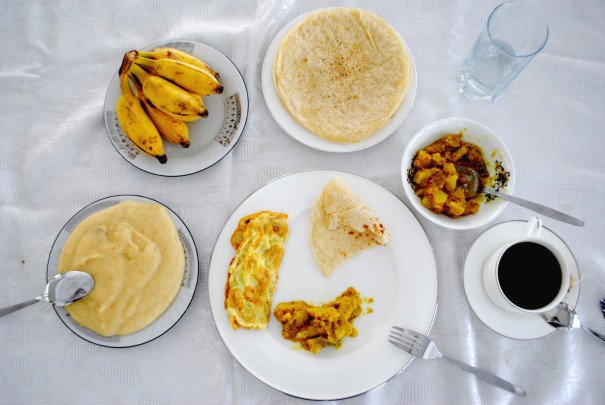
Breaking Bread in Bangladesh

Breaking Bread in Bangladesh
Thanksgiving in Bangladesh
Thanksgiving 2014 started with a deliciously greasy omelet spiced up with hot green chili peppers cut into thin circles; roti, a flat wheat bread, accompanied by sabji – the chef’s choice of a cooked vegetable dish, that day a curry of potato and dal, or lentils. One should tear the roti into small pieces to mop up mouthfuls of curry, though I’m often tempted to roll up vegetables and eggs in the roti like a burrito. There was also a dish of shuji, a semolina-like concoction of rice and wheat sweetened with sugar and studded with large cardamom seeds, and black tea flavored with tulsi (basil) from northern Bangladesh, not far from neighboring Darjeeling in India. The small yellow bananas grow locally and are sweet and dense with flavor.
The meal was prepared by Mumtaz, the cheerful young cook in the private guesthouse where I was fortunate enough to stay for a couple weeks. The white bungalow perched on the edge of the Rupsa River that splices Khulna, Bangladesh’s third-largest city and the gateway for the mighty mangrove forests of the Sundarbans. I was in Bangladesh on a reporting trip, writing about how rural communities in this vulnerable country are adapting to climate change.
The bungalow’s long verandah offered unparalleled views. Bangladesh sits on Asia’s largest river delta and its 700-plus hundred rivers are the country’s lifeblood. Every day from my aerie I watched the traffic of boats chugging up and down the river, which stretches more than a half-mile wide. There were large metal trawlers carrying mounds of sand for construction; humble wooden fishing boats shaped like daggers powered by wiry men pushing oars; ferries carrying dance parties blaring pop music.
The pleasant day was very different from Thanksgiving in Bangladesh in 2007. I was on my first trip to Bangladesh then, sent there to cover the aftermath of Cylcone Sidr when I was a foreign correspondent based in Delhi. The cyclone had hit the coastal southwest near the Sundarbans, leaving more than 3,400 dead.
For several days I traveled with aid organizations to report on relief efforts. I talked to villagers who had lost everything. Flimsy homes were crushed or blown away. Fields and ponds of drinking water were flooded with salt water. I remember homeless survivors had set up makeshift shelters made of sticks covered with old saris. The colorful shelters stretched along dirt roads as far as the eye could see.
For much of Thanksgiving 2007, I was with aid workers from the NGO Islamic Relief on our eight-hour drive back to Dhaka. The cyclone had disrupted transportation along roads and ferries that traversed the rivers along the route. Our jeep sat waiting to board a ferry for an all-night journey. There was nothing to do but wait in the darkness and hope for sleep.
It was one of those trying travel situations in the developing world where one practically has an out-of-body experience to push through the hours, something I’d experienced during long hard-seat (or no-seat) train rides in the wild west that was China in the late 1990s.
So on Thanksgiving 2014, I was fortunate to have this breakfast that Mumtaz the cook had prepared in a kitchen stocked with fresh vegetables, fish and shrimp. I finished my morning tea gazing out at the bustling river view, thankful for my second Thanksgiving in Bangladesh.